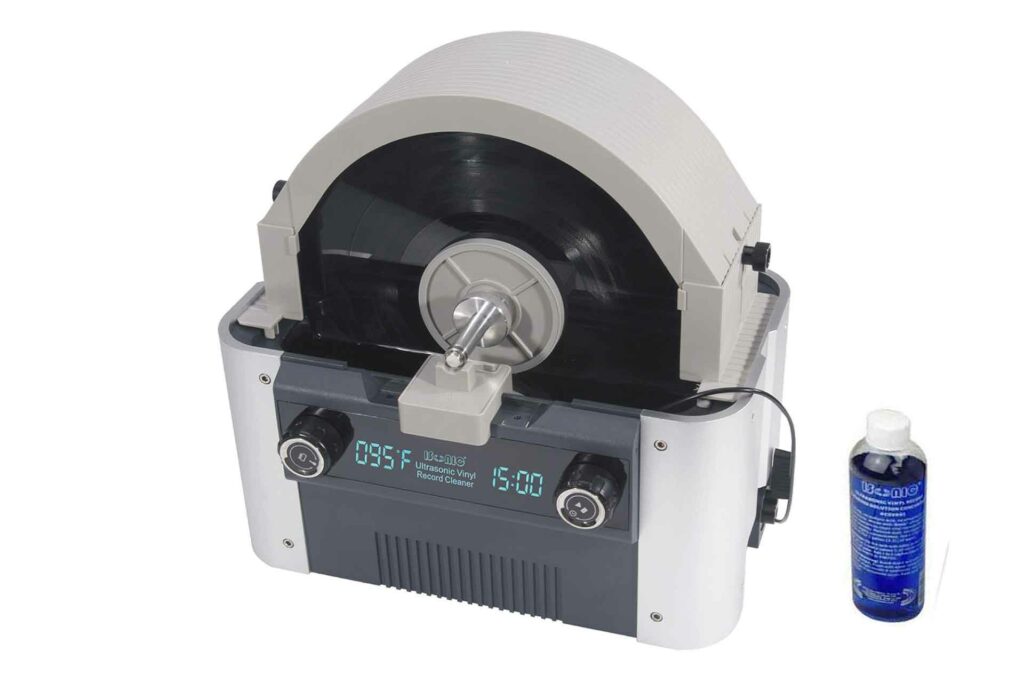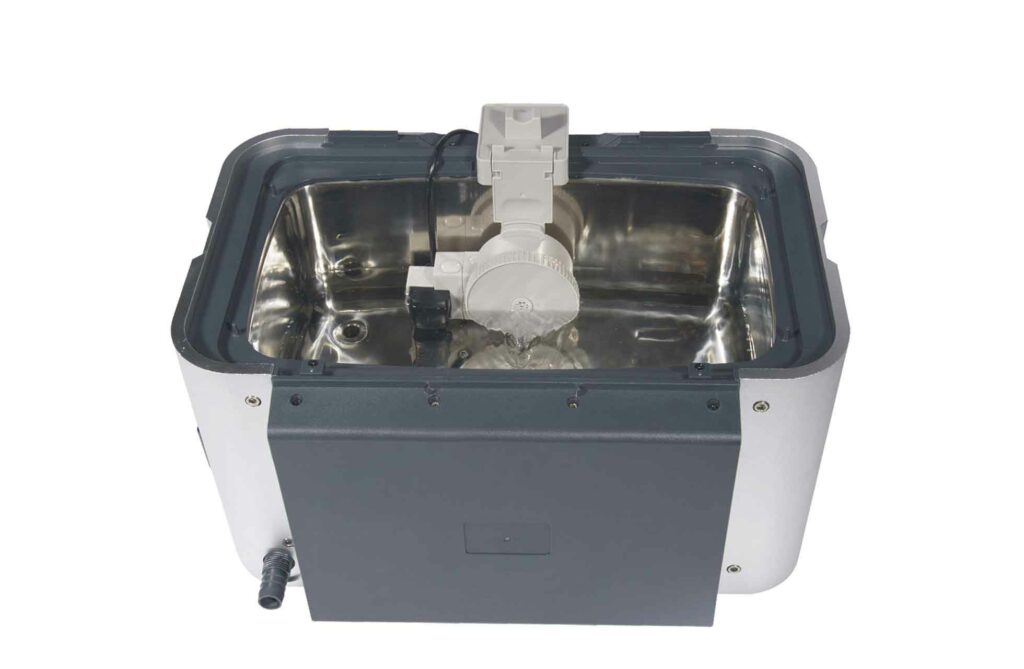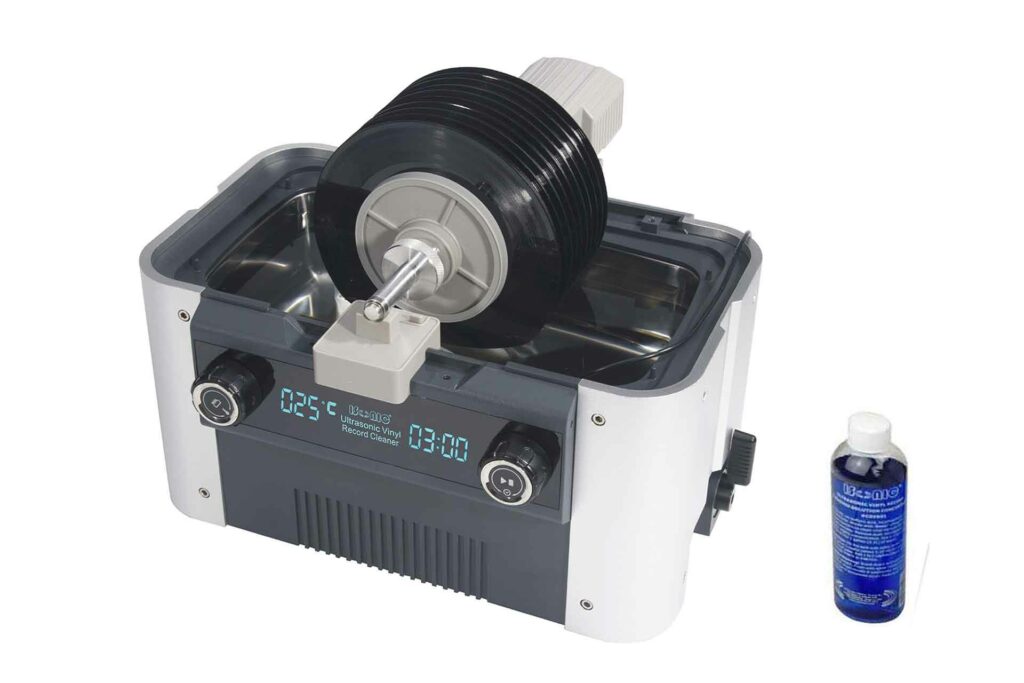Some music fans buy one LP a week, others one a day, and still others buy so many that they can’t (or won’t) keep count. The Isonic CS6.1 Pro is the record cleaning system for the that last group, the LP-purchasing power users or record store owners who see a constant stream of records in need of deep cleaning. Instead of a one-at-a time cleaner like the Record Doctor VI or GrooveWasher systems, the Isonic CS6.1-Pro cleans batches of up to ten LPs at a time. The CS6.1-Pro is the company’s newest LP cleaning machine, and like its other industrial products, this one uses a system that employs a combination of water, cleaning fluid concentrate, and high-speed vibrations to do its cleaning. Isonic claims its methodologies produce a cleaning efficiency that is 40 percent higher than its competitors. Isonic doesn’t name those competitors or explain how they came up with that figure, though.

What Makes The Isonic CS6.1-Pro Record Cleaning System Special?
- The CS6.1-Pro delivers a complete record care solution that includes automatic spin drying. You don’t need to acquire any new physical techniques – just load up the CS6.1-Pro, set it to clean for either a three-, five-, eight-, 10-, 12-, or a 15-minute cleaning cycle and push start.
- It can handle not only 12-inch LPs, but also 10-inch EPs, 45 singles, and even old 78 RPM discs. Not only can it clean a variety of disc sizes, but you can also mix and match different-sized discs in the same cleaning batch.
- The CS6.1-Pro has a step motor that work in the cleaning and drying cycles. The step motor can run at any speed from 10 RPM (revolutions per minute) during cleaning to 600 RPM during the spin-drying cycle. The overall noise level is slightly lower than other machines I’ve used.
- The CS6.1-Pro has a heater that can be set independently from the ultrasonic settings. Warming the water makes the cleaning process even more effective, so if you have a batch of especially grody discs, the CS6.1-Pro’s combination of heat and cleaning intensity should power through them with ease.
- The combination of aluminum and plastic makes the CS6.1-Pro more physically robust than some similar solutions. Some parts, such as the adjustable cowl that goes over the top of the cleaner during use, are plastic. But the CS6.1-Pro’s main chassis is metal.
- The CS6.1-Pro system includes double-sided reusable label protectors for each disc you clean, which seal off the labels against any potential water damage during cleaning. You only need to use one between each pair of records, and as long as the stack has been assembled correctly, the labels will stay completely dry.
- The CS6.1-Pro system is a little bit more tolerable in terms of noise than other audiophile record cleaners as it operates at a pretty quiet 56 dB which isn’t all that loud.
Why Should You Care About the CS6.1-Pro Record Cleaning System?
If you are into buying used LPs, you know they usually need a thorough cleaning to deliver their optimal sonic performance. If you buy a lot of discs and own a record cleaning system that can only do one disc at a time, the pile of discs waiting to be cleaned can grow to stress-inducing size in no time. The Isonic CS6.1-Pro, with its 10-disc maximum capacity (you can clean fewer discs in a session if you wish, but why would you?), should be capable of keeping up with even the most avid audiophile record collector. Used record store owners might want to acquire a CS6.1-Pro for their shop – they could either offer already cleaned records or a cleaning service to customers, which could easily pay for the machine’s cost and turn into a profit center for their store.

Some Things You Might Not Like About the Isonic CS6.1-Pro
- The Isonic cleaning methodology involves water with a concentrated cleaning solution added to it, which must be drained after each cleaning cycle before the spin/dry cycle begins. If you do not have a work surface next to a sink where you can set up the CS6.1-Pro, you will need a bucket and a bottle to hold the fluid.
- The CS6.1-Pro does require care and precise setup. If it is not set up with the bracket spindle properly centered, it will produce far more vibration and shaking during the spin cycle when it revs up to 600 RPM. Also, the spacers between albums must be positioned so that it makes a good seal on the record. If there’s a leak, the label will get wet. So, while the CS6.1-Pro does not require learning any new physical skills like the Record Doctor or VPI cleaning systems do, it does need more care and patience during the initial setup than those machines.
- Using the CS6.1-Pro is a process that requires more time and attention than some other cleaning systems. Because of the aforementioned water element, time must be set aside for both setting it up and breaking it down at the end of the cleaning session. The Record Doctor IV and VPI 16.1 machines can be left set up and ready for use on a shelf.
- It’s easy for the CS6.1-Pro to produce too much foam during use. This can happen if you add just a bit too much of the concentrated cleaning concentrate, which is easy to do, especially during the first couple of cleaning sessions. Isonic recommends spraying some alcohol into the solution to knock down the foam if becomes too foamy. So, you may need to add a spray bottle with Isopropyl alcohol to your audio toolbox. Isonic is working on a new formulation of their solution to have less foam currently.
Listening to the Results of the CS6.1-Pro Cleaning System…
Instead of a before- and after-cleaning comparison, which would require me to play an uncleaned record that could easily shorten the life of my rather expensive phono cartridge, I played a record I had cleaned with the VPI 16.5 cleaner and then I cleaned it (along with nine other discs – why waste solution?) on the Isonic CS6.1-Pro. When I played the re-cleaned disc, perhaps it had slightly less surface noise. Perhaps. The difference was subtle, because the combination of the VPI machine and my techniques using it, developed over many years, usually results in a pristine record. I played a couple of the other records that were in the same cleaning batch. They all sounded clean, and none had any drying marks or remnants of leftover fluid. Obviously, the CS6.1-Pro does an outstanding job of cleaning records. And as long as you set it up correctly, it requires no additional skills to produce superb results.
It usually takes me about four minutes to clean a record on the VPI: taking the record out, setting it up on the cleaner, cleaning, then drying, and returning it to its sleeve. A session with the Isonic CS6.1-Pro takes quite a bit longer, but if you do ten discs at a time the average time per disc is slightly less. If you do something wrong while using the VPI, the worst thing that could happen is one damaged record and a bit of cleanup. With the CS6.1-Pro you can, if you don’t set up the machine properly, or use too much cleaning solution, or forget to put on the cowl before the spin cycle, end up with quite a bit more of a mess on your hands.
Does The Isonic CS6.1-Pro Have Any Resale Value?
Unlike most of the products I review for FutureAudiophile.com, where I can do some research via the usual used gear sites and get an idea of resale value, I’ve never seen an Isonic cleaning machine come up for resale. The CS6.1-Pro a tool that, once acquired, will most likely be kept by its owners for many years. If one did come up on the used market, it would need a careful evaluation of condition – usage and wear will be a major factor in determining a fair resale price.

Who Is the Competition for The Isonic CS6.1-Pro?
While there are plenty of single-disc vacuum systems for LPS, including Record Doctor, VPI, Nitty Gritty, Okki Nokki, and Pro-ject, as well as single-disc ultrasonic cleaners from KL Audio. Degritter, and Audiodesk and kits to turn Omegasonics and Vevor industrial ultrasonic cleaners into multi-disc record cleaners, only Isonic offers a complete, fully configured multi-disc ultrasonic cleaning systems. Most of the competing ultrasonic machines that have multi-disc capabilities via an added accessory are not as cohesive and flexible as the CS6.1-Pro.
The primary issue with all the single-disc vacuum cleaning systems is that some physical dexterity and skill are required to achieve the best results. The brush technique and fluid application are not intuitive and require some practice to perfect. Also, the stiffness and cleaning ability of brushes varies from one system to another. Hard bristles are better at removing dirt, but can scratch a disc more easily, while soft bristles may not be enough to remove the harder-to-get-at crud.
The primary issue with single-disc ultrasonic cleaners is that they can take quite a bit of time per disc. Most require a sink or area that can accept runoff from the used fluid. They can also be rather loud. Most have spin dry cycles, which on the less robust machines may not be enough to spin off all the leftover fluid completely. Also, don’t expect a less expensive single-disc machine to be as robust as the larger multi-disc-capable ones.
Final Thoughts on the Isonic CS6.1-Pro Audiophile Record Cleaner
If you have read this far, I suspect you may be considering a serious record cleaning machine. Perhaps you even already own a single-disc cleaner and realize that you can’t keep up with your influx of newly acquired discs cleaning them one-by-one. If so, you’re an ideal future owner of an Isonic CS6.1-Pro. While not inexpensive, especially compared to single-disc vacuum systems like the Pro-Ject, Record Doctor, or Okki Nokki, the CS6.1-Pro will save you time cleaning records and encourage even a power-buyer to stay up to date on their record cleaning responsibilities.
The primary downside of the Isonic CS6/1-Pro record cleaning system is that it is not a casual affair. You must set it up optimally to achieve optimal results, and as with most new systems, there is a learning curve and some personal trepidation during the initial setup. On subsequent cleaning sessions it gets much easier, and the setup goes quicker. Each cleaning session will require at least 25 minutes of time. And while it does not require your full attention during the entire cleaning process, the CS6.1-Pro does have to be loaded and unloaded and switched from clean to spin dry manually, so you can’t get too far away from it during a cleaning session.
If you are a serious record buyer, collector, or used record store owner, you need a heavy-duty multi-disc record cleaning system. The Isonic CS6.1-Pro is exactly what you want.




The $1000 price tag is high, but I think considering the competition it is certainly not out of line for the serious record collector. If you search there are cheaper versions of this type of machine, but without the ability to compare them, this seems like a very good option.
I’ve seen some on Amazon costing in the $4,000 range.
This is a VERY PRO unit. As Steven says, it is more for the record store or the BIG COLLECTOR than the casual vinyl guy with say 100 to 200 LPs.
This machine is NOT A “VERY PRO” UNIT. It places records too close together to achieve effective cavitation. I tested it for cavitation. Calling it a machine that uses “vibrations” to clean records is below what I expect from Steven Stone. What does that even mean? Have you checked the chemicals used in the supplied fluid for its efficacy or safety cleaning vinyl records? (Answer: no). When you spin dry a record coated with a cleaning chemical (that you didn’t examine) the chemical dries onto the record surface.
Mike,
I think you missed Steven’s point (note: he’s no longer on staff at FutureAudiophile.com) which was compared to many MUCH MORE AFFORDABLE clearners that we reviewed, the scope of this record washer is more commercial – meaning good for record stores and people with HUGE record collections.
Whether you liked the unit or not is well, your opinion. I’ve seen it in use and like it. I saw Jerry (the guy who owns the company, not me) using it at AXPONA. It looks pretty cool to me but I don’t anywhere near that kind of need for record cleaning, personally.
Say Hi if you see me in OC for THE Show.